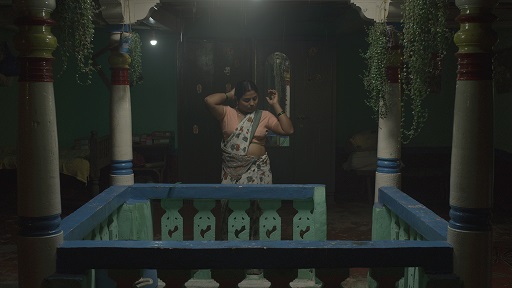A look at Ere Gowda’s directorial debut, Balekempa (The Bangle Seller), a Kannada film that received the FIPRESI Jury Award at the International Film Festival Rotterdam for its “subtle and delightful portrayal of a universal theme against the backdrop of a rich local culture.” The film was also recognized for “tackling patriarchy and feminism in a small South Indian village, using the lives of a childless couple as the entry into a world that is all too familiar, yet ultimately revealing.”
At the heart of Balekempa is Kempanna, a diligent bangle seller who tirelessly traverses the countryside, offering sought-after beauty and adornment products for women. While he remains oblivious to his marital responsibilities and his dutiful but unfulfilled wife, Kempanna goes about his daily duties in an unassuming manner, much to her dismay and stoic acceptance.
Balekempa transcends the story of a simple, quiet, and hardworking bangle seller. The supporting characters bring their own radiance to the narrative, illuminating the otherwise routine activities in the village, where the residents engage in their daily tasks with regimented regularity. Be it tending to cattle, selling vegetables, or engaging in gossip while aiding one another in a familial manner.
Ironically, Kempanna, as a bangle seller, goes the extra mile to adorn the hands and faces of the women who gather around him, yet he maintains an aloof and matter-of-fact demeanor towards his wife, who longs for companionship and, more profoundly, to bear a child. Ere Gowda skillfully captures the contrasting emotional dynamics of the couple through the visually vibrant camerawork of Saumyananda Sahi, who also serves as the film’s editor. The film’s minimal dialogue ensures that viewers are completely immersed in the characters’ daily lives, elevating Balekempa beyond a simple pastoral tale.
Minimalist, yet efficacious and evocative, the mis en scene creates the big picture of the languid village life and the couple’s existentialist existence, even as the underlying frisson of physical desire and an aching for conjugal companionship pulsates on the periphery.
As to the consciously cold relationship that the Kempanna couple keep up amidst pretenses of marital bliss, it is through the villagers’ familiar fodder of hearsay that one learns that the couple are still childless. Saubhagya, Kempanna’s wife, and her mother earnestly seek divine intervention to bless the couple with a child and awaken a sense of responsibility in Kempanna, despite his indifference to his wife’s desires. The reasons behind their situation are subtly and silently conveyed through carefully structured visual storytelling, unraveled at a deliberately unhurried pace.
Ere Gowda’s choice to cast non-professional actors like he did in Thithi transforms Balekempa into a powerful and poignant portrayal of family life, showcasing the discerning eye of a seasoned filmmaker. Balekempa becomes a lyrical lament for a marriage strained by the bangle seller’s asexual disposition, while his wife longs for physical intimacy and fulfillment. We witness how suppressed desires remain poised to erupt, like a smoldering volcano.
In summation, even as the enterprising and ensemble narrative vividly captures the vignettes of village life in all its vibrant detail, the film draws viewers subtly and sensuously into the interplay of human relationships, which forms the fulcrum of Balekempa and its resident deities, all caught in the thrall of their individual destinies.[/vc_column_text][/vc_column][/vc_row]

Leave a Reply
You must be logged in to post a comment.